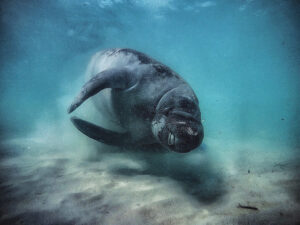This is the time of year for migrating manatees! So, slow down and look out for them. As water temperatures cool, manatees naturally migrate to warmer waters, generally warmer than 68 degrees to survive the winter. So, in the fall they travel to Florida springs, power plant discharges and other warm-water sites.
Manatees can be difficult to see, especially when you travel in a boat on the water. You may see a swirl on the surface caused by the manatee when it dives; see an animal’s back, snout, tail or flipper break the surface of the water; or you may only hear the manatee when it surfaces to breathe. In all of these instances, keeping your distance and passive observation are the best ways to view manatees. Boat slow and look out below to allow them to swim safely.
While manatees are large, they can be difficult to see in the water. The West Indian manatee is an imperiled species and is protected by state and federal law. Please avoid harassing or disturbing manatees whenever you discover that manatees are in the water near you. Harassment is defined as any activity that alters the animal’s natural behavior. By altering the manatee’s natural behavior, you may create the likelihood of danger that is bad for the animal and against the law.
That’s why it is important to follow guidelines and follow all manatee protection zones; look out while boating; wear polarized glasses and always give them space. Manatee protection zones are marked by waterway signs and maps of manatee protection zones are available online at MyFWC.com/Manatee by clicking on “Data and Maps.” Disturbing manatees at warm-water sites can cause them to swim out of those protected areas and into potentially life-threatening cold water.
During the colder months, Slow down in certain areas to prevent manatees from being injured or killed by motorboats or personal watercrafts. Boat strikes continue to be a major threat to Florida manatees.
 Being Near Manatees
Being Near Manatees
Look, but don’t touch manatees. Also, don’t feed manatees or give them water. If manatees become accustomed to being around people, they can alter their behavior in the wild, perhaps causing them to lose their natural fear of boats and humans, which can make them more susceptible to harm.
Do not pursue or chase a manatee if you see one while you are swimming, snorkeling, diving, paddling or operating a boat.
Never poke, prod or stab a manatee with your hands, feet or any object.
If a manatee avoids you, do not chase the animal for a closer view.
Give manatees space to move. Avoid isolating or singling out an individual manatee from its group and do not separate a cow and her calf.
Keep hands and objects to yourself. Don’t attempt to snag, hook, hold, grab, pinch, hit or ride a manatee.
Avoid excessive noise and splashing if a manatee appears nearby. The manatee may be resting and may surface without being aware of your presence. Noise and activity may startle the animal awake, which may put it in harm’s way if it is frightened and leaves the area.
If the site you visit allows in-water activities near manatees, use snorkel gear and float at the surface of the water to passively observe manatees. The sound of bubbles from SCUBA gear or other devices may cause manatees to leave the area.
Physically handling a distressed or stranded manatee might cause more harm. Instead, report injured, distressed, sick or dead manatees to the FWC’s Wildlife Alert Hotline at 888-404-FWCC (3922) or dialing #FWC or *FWC on a cellphone so trained responders can assist.
Additional resources for boaters, educators and other interested members of the public are available at MyFWC.com/Manatee.
Are you interested in supporting the FWC’s manatee research, rescue and management efforts? You can purchase a Florida manatee license plate, or donate $5 to receive a collectable FWC manatee decal. Both are available from your local Tax Collector’s office.
The post Manatees are in Motion! appeared first on South Walton Life | 30A News, Events and Community Information.

Be the first to comment on "Manatees are in Motion!"